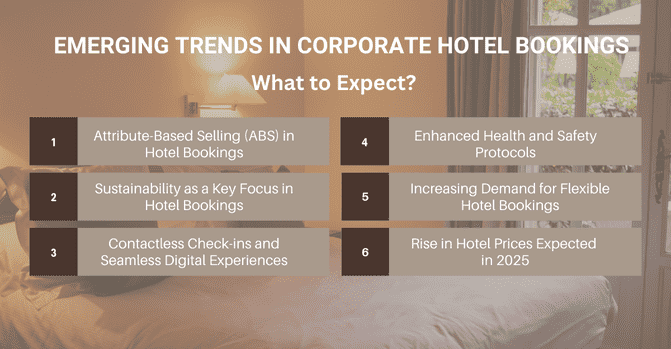
The business travel landscape has undergone significant transformation over the past few decades. In the 1990s, corporate travel was dominated by fixed itineraries and travel agents, with minimal flexibility and digital integration. As the 2000s rolled in, the rise of online booking platforms like Expedia and Travelocity started to give business travelers more control and choice, slowly shifting the industry towards flexibility and convenience.
By the 2010s, the widespread adoption of mobile travel apps and personalized travel management systems revolutionized how companies and employees handled business trips, offering real-time adjustments and customization.
Today, corporate travel continues to evolve with global shifts brought on by technological advancements and changing consumer expectations. In 2020, the business travel sector faced a significant downturn due to worldwide lockdowns, travel restrictions, and economic uncertainties. However, as restrictions lifted, the industry rebounded with new expectations from travelers and service providers.
In 2025, business travel is projected to look remarkably different. Business travelers expect to see new technological innovations, enhanced health and safety protocols, and an increased focus on flexibility in travel arrangements. According to the Global Business Travel Association (GBTA), global business travel spending is expected to mark a full recovery from the pandemic-driven slump.
Hotels, as the cornerstone of the travel industry, will play a pivotal role in this resurgence by adapting to the needs of corporate travelers.
Hotel room rates are forecast to increase by 2.6% globally in 2025. If this growth trend continues at a similar rate, we could anticipate a compound annual growth rate (CAGR) of approximately 2.6% from 2025 to 2030.
By the end of this decade, global hotel room rates could see a cumulative increase of nearly 14%, reflecting broader economic conditions, inflation, and evolving travel demands. This is through emerging trends focusing on convenience, personalization, and seamless experiences.
This blog will explore these emerging trends and what business travelers can expect from corporate hotel bookings in 2025.
Evolving Expectations of Business Travelers in 2025
As the world of business travel adapts to new realities, so too do travelers’ expectations. Business travelers increasingly seek experiences prioritizing convenience, personalization, and safety. According to a survey, eight out of ten travelers are open to staying at a hotel that features a fully automated front desk or self-service check-in kiosk.
These changing preferences are driven by a demand for comfort and efficiency during trips as travelers balance busy work schedules with their well-being.Flexibility will be a critical component of corporate hotel bookings in 2025, with travelers expecting the ability to modify or cancel their reservations without incurring penalties.
Moreover, a Booking.com survey shows that sustainability is becoming a top priority, with 72% of corporate travelers would be more likely to book a hotel if it was certified as green. The desire for contactless interactions and advanced health measures will also continue to shape travelers’ expectations in a post-pandemic world.
6 Key Trends in Corporate Hotel Bookings for 2025
2025 is just a few months away, and business travel is expected to see many changes. There may be new trends and changes that we can expect, especially in corporate hotel bookings.
Mentioned below are some of them:
1. Attribute-Based Selling (ABS) in Hotel Bookings
One of the most exciting innovations expected to reshape the corporate hotel booking landscape in 2025 is Attribute-Based Selling (ABS). Attribute-Based Selling (ABS) is a dynamic pricing and selling strategy used primarily in the travel and hospitality industries. It focuses on selling individual features or attributes of a product or service rather than offering it as a whole package.
For example, instead of presenting hotel rooms by room type alone (e.g., standard, deluxe), hotels using ABS would allow guests to choose specific room attributes such as view, room size, bed type, floor level, or additional amenities like breakfast or parking. Key features include personalization, flexible pricing, enhanced customer experience, better inventory management, etc.
This approach shifts from traditional room-based pricing models to a more flexible, customizable experience. Traditional hotel bookings sell rooms as standard units with fixed amenities and features.
On the other hand, attribute-based selling allows travelers to select and pay for specific attributes they value, such as a room with a city view, an early check-in option, or access to a high-speed internet connection. ABS empowers business travelers to create a tailored experience based on their needs and preferences. This level of customization empowers business travelers to tailor their experience precisely to their needs, adding comfort and efficiency to their trips.
According to Fernando Vives, the Chief Commercial Officer at NH Hotel Group, ABS enables hotels to unbundle their offerings and sell room features individually, much like how airlines allow passengers to choose add-ons such as extra legroom or priority boarding. This approach gives travelers more choice and control and enables hotels to increase revenue by selling highly sought-after features at a premium. Travelers, in turn, enjoy a more dynamic selection process, paying solely for the services that matter most to them.
For example, a business traveler attending a conference may prioritize early check-in, a quiet room for work, and access to the hotel’s business center. With ABS, they can specifically select and pay for these attributes, while another traveler may choose different features such as proximity to the fitness center or enhanced cleaning services. The ability to hand-pick features creates a more tailored, productive, and satisfying travel experience.
ABS significantly impacts hotel revenues. A study conducted by Eye for Travel suggests that hotels utilizing ABS can boost their ancillary revenue by up to 15%. Rather than paying for blanket packages that may include unnecessary extras, businesses can control costs by allowing employees to book only the services they need. This flexibility is beautiful for organizations operating under tight travel budgets, making ABS a game-changer in corporate travel management.
In short, ABS is set to revolutionize the hotel industry, offering personalized, cost-effective experiences for travelers while driving more significant revenue opportunities for hotels.
2. . Sustainability as a Key Focus in Hotel Bookings
In 2025, sustainability will be a critical factor influencing corporate hotel bookings, driven by company policies and traveler preferences. More businesses are adopting environmentally conscious practices as part of their corporate social responsibility (CSR) strategies, and this trend extends to travel choices. Hotels prioritizing sustainability will increase demand, as 71% of global travelers seek sustainable accommodation options.
Sustainability in hotels includes energy-efficient designs, waste reduction programs, and sourcing locally produced and environmentally friendly products. Some hotels already offer carbon offset programs for stays, allowing travelers and companies to minimize their environmental impact. Additionally, many hotels are transitioning to renewable energy sources and implementing water conservation efforts.
For corporate travelers, choosing green hotels is an ethical decision and a business imperative as organizations increasingly report on sustainability metrics. Hotels promoting their sustainability efforts will have a competitive edge in securing corporate contracts in the coming years, especially as businesses look to align their travel choices with their broader environmental goals.
3. Contactless Check-ins and Seamless Digital Experiences
Contactless technology in corporate hotel bookings has steadily gained traction over the past few years, driven by a focus on health, safety, and convenience. Mobile apps, QR codes, and other digital innovations allow business travelers to check in, access their rooms, and manage their entire stay without interacting with hotel staff. While this technology has gradually increased in popularity, especially following the pandemic, it is expected to become ubiquitous by 2025, transforming corporate travel into a more seamless, contact-free experience.
According to a survey by Deloitte, 89% of corporate travelers will prefer hotels that offer contactless services, as it eliminates wait times and enhances overall efficiency. Moreover, digital room keys and mobile apps that allow guests to control their room environment (lighting, temperature, etc.) will further personalize their stay. Hoteliers invest heavily in these technologies to stay competitive and meet traveler expectations for a seamless experience.
4. Enhanced Health and Safety Protocols
The pandemic has permanently altered how travelers view health and safety during their hotel stays. In 2025, business travelers will continue to prioritize cleanliness and hygiene when choosing accommodations. Enhanced cleaning protocols, air filtration systems, and the availability of hand sanitizing stations will be standard features in most corporate hotels. In addition to physical cleanliness, hotels are expected to incorporate technology to monitor air quality and ensure compliance with health standards. For example, Hilton has launched a “CleanStay” initiative, which includes digital cleanliness seals to ensure rooms have not been accessed since they were cleaned. Business travelers expect such measures to be a given rather than an added benefit.

5. Increasing Demand for Flexible Hotel Bookings
Flexibility will be a defining factor in corporate hotel bookings in 2025. Business travelers want the ability to make last-minute changes to their plans, whether adjusting their check-in time or extending their stay. The demand for flexibility has risen sharply since the pandemic, with travel disruptions making it essential for companies to have policies that accommodate real-time changes.
According to a survey, most companies plan to invest in tools that provide travel booking and management flexibility. Hotels are expected to cater to this by offering flexible check-in/check-out times, refundable bookings, and no-cost cancellations. This trend is driven by convenience and the growing unpredictability of global travel.
6. Rise in Hotel Prices Expected in 2025
As demand for corporate travel returns, a corresponding rise in hotel prices is anticipated in 2025. According to a forecast by CWT, global hotel prices are expected to increase by up to 4.5% annually through 2025. This surge can be attributed to inflation, increased operational costs, and hoteliers’ investment in new technology and health protocols.
However, this price rise does not mean travelers will settle for less. Instead, they will expect added value for their money through improved services, advanced amenities, and personalized experiences. Business travelers are also likely to seek more bundled services, such as packages that combine accommodation with dining, transport, and meeting room access to mitigate rising costs.
Time to Embrace the Trends for Corporate Hotel Bookings in 2025
As we move toward 2025, corporate hotel bookings are set to become more dynamic, flexible, and personalized than ever before. Emerging trends such as contactless check-ins, enhanced health and safety measures, flexible booking options, and rising hotel prices will redefine the business travel experience. Additionally, innovations like Attribute-Based Selling (ABS) will give travelers more control over their hotel stays, allowing them to customize their experience based on individual preferences and needs.
These changes will offer both challenges and opportunities for business travelers. Rising hotel costs will require companies to rethink travel policies and budget allocations. On the other hand, the increased flexibility, convenience, and personalization offered by new booking technologies will enhance the overall travel experience, making business trips more comfortable and efficient.
As we approach 2025, business travelers can expect a more seamless, flexible, and personalized experience reflecting the changing nature of work and travel.











